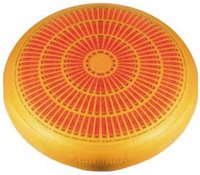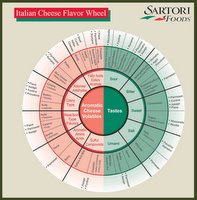New Science is an ass



There are a few things that really irritate me about the nature of that recent scientific investigation into wine and cheese pairings. It's like The New Scientist studied a small wedge within the world of the foodie but went on to publish sweeping generalizations. Click on the small piece of the cheese wheel pictured above for their limited findings (which, could be summed up to "All cheese ruins your ability to appreciate wine"). Then click on the full wheel of Emmenthal cheese for a nuanced and more complete report (thanks to the consultation of a sommelier). Then at the end of the row, which I consider to be a little evolutionary chart on this wine-cheese conundrum, click on the flavour wheel. Personally, I think this diagram conveys more useful information than the details presented in The New Scientist. Even though the wheel only tries to represent Italian cheeses, you get a feeling that cheeses on opposite sides of the wheel possess very different characteristics -- yes, in fact, the world of cheese can be viewed through more than one single category labelled "cheesy".
But cheesy says it all in The New Scientist report. A cheese is a cheese is a cheese. Mild or strong, soft or hard, from the milk of a cow or the milk of a yak, it's really all the same to a wine drinker. Really? If the purpose to this investigation was to announce that dairy will change the way you taste your wine, then they should've called me. I could've saved them time and money by pointing out that eating ice cream while drinking claret is like a ticket that takes your palate on a trip to a parallel universe. We all know that. We've all been there.
And no one knows this more than professional wine tasters. You never see wine competition judges with a Ritz-Bits travel pack in their pocket. And I can't seem to recall Jancis Robinson packing string cheese for her ventures into Château Petrus. Obviously these people want an unbiased and level playing field when they make their critical judgments on a wine. Which is exactly what differentiates them from the audience this report seems to have been written for: us everyday wine drinkers. The people who don't get paid for sipping. The fact is everyday folk open a bottle of wine for enjoyment. That's part of the reason we don't spit it out after we taste it. We are not going to rate its structure, balance and complexity. We're going to savour it. And I'll be damned if The New Scientist has uncovered my palate's displeasure when I combine goat's cheese with Cabernet Franc. On contrary, this is a wine-cheese combo that proves itself worthy time after time.
It's obvious that some wine and cheese pairings don't produce as much harmony or pleasure. But some are quite exquisite combinations, no matter how many fatty molecules "bind" to the wine or whatever "proteins" dull the tastebuds. This is why tasting is an art and the guy in the lab coat doesn't get it. I like to nibble on a little bread and cheese when I have my favourite wines because it just makes everything around me seem right. Maybe there is some documented logic for why wine and food produces my happy place, but for now, all I can say is that until science disproves the fireworks that go off when I eat chevre with my Cab Franc I'm going to continue assuming that this study doesn't really say much about my wine pairing habits.
So now it's off my chest. I detest this report and the effect its had on the wine blogging community -- not only for a message that gets misdirected to the wrong wine-drinking audience, but also for its sweeping generalizations. Oh poor cheesemaker! Your craft has been reduced to a cartoon-like orange wedge that sits atop a mousetrap. In reality, there is a vibrant and full gamut of unique and individual cheeses out there. Take Schabzieger as a random example. Now here is a cheese that features no milk fat at all. So was The New Scientist speaking on its behalf when is smackdowned the entire cheese-producing industry? In parts of the world that are dominated by French culture, there are uncountable names for types of cheese. Why? Because they are all so different, each one with its own special characteristic. It's like snow and people who live in igloos. There are over a dozen ways that the Inuit convey the idea of "snow". Not because these northern dwellers are especially wordy types but because they've been around snowy stuff enough to distinguish a plethora of notable attributes. Same thing applies for cheese. It's too vague a term to convey much meaning. Especially if you're trying to be scientific about something. Yes, I'm talking to you Mr. New Science.







3 comments:
Interesting commentary. I can certainly appreciate your two most salient points, namely 1) any extraneous smell or taste will affect the evaluation of a wine, and 2) the enjoyment of wine is often enhanced by food and vice versa.
But there are a couple of things to point out. To my knowledge the actual research paper, while being accepted for publication, has not yet been published. And its not going to be published in the New Scientist. It will appear in the American Journal of Enology and Viticulture early this year; apparently in the first issue for 2006. The citation is Sensory Effects of Consuming Cheese Prior to Evaluating Red Wine Flavor. B. Madrigal-Galan and H. Heymann Am. J. Enol. Vitic. 57(1):2006.
The Madrigal-Galan and Heymann study is described in the “In Brief” section of the New Scientist. The commentary is four short paragraphs below a photograph of wine glasses, cheeses and a loaf of bread. A newsier article can be found in the San Francisco Chronicle on-line site at http://www.sfgate.com/cgi-bin/article.cgi?f=/c/a/2005/06/16/WIGFFD8IBQ1.DTL.
It is interesting to consider the title of the Madrigal-Galan and Heymann paper. It does not imply an analysis of wine and food pairings, but rather the sensory effect of cheese consumption before evaluating a wine. It is a fair argument that the New Scientist commentary does argue that wine and cheese do not mix well, but my feeling is that the Madrigal-Galan and Heymann paper will be more circumspect in its interpretation.
It appears, from the SF Chronicle piece, that the authors did set out to analyze the presumed affinity of wine and cheese, and it is also true that their study was not exhaustive. It was limited to 8 red wines and 8 cow's milk cheeses for a total of 64 combinations with 11 tasters using 20 common wine descriptors. By my calculation that could total over 14,000 pieces of data. But then the tasting order of the wines was switched and the tasting done again. Presumably an equally large data set. Once you begin to realize the amount of data that even this small study generates it becomes easy to see why they did not examine all possible combinations of wine and cheese. Even testing the combinations that have subsequently been proposed on various wine forums and blogs would have been prohibitive. In any case this study does not preclude others from performing additional research.
The two hypotheses that 1) proteins in the cheese may bind to flavor molecules in the wine, or 2) that fat from the cheese may coat the mouth, deadening the tasters' perception of the wines' flavors need to be tested. And it is quite possible that those future studies will result in a greater ability to understand how to match wine and cheese – they may even result in new wines and/or cheeses that provide more perfect matches. A single study, like that of Madrigal-Galan and Heymann, is not the be all and end all of scientific investigation. It is simply one point along the journey of understanding.
Mike,
There's no pet peeve that Doktor Weingolb won't overstate. Thanks for adding your reasonable voice and tempering this post. It was quite ignorant of me to assume The New Scientist had a role in this study -- I should make myself more familiar with the ways these periodicals publish research submitted to them. Seems unfair that The New Scientist does not get the actual paper (glad to hear that there's more depth to this) but is allowed to trumpet the findings in a rather slapdash, perhaps subjective, manner. I suspect they add a layer here that even those who conducted the actual research find troublesome. No disrespect to science. It's when the media gives it meaning by bringing it to the people that things can get quite messy. So interpretation is everything. Best not botch things up.
Is it true you're an ex-pat Aussie? It's this week every year that wish I were in Melbourne.
Yes I'm an expat - been in the USA since 1982. Was in Melbourne last December - cloudy and raining as usual! Plus they are getting ready for the Commonwealth Games so its real mess.
I can confirm that the researchers behind the wine/cheese study do think that the press has not accurately reported their work. Once its published online I'm sure we will have a much better idea of their findings.
Mike
Post a Comment